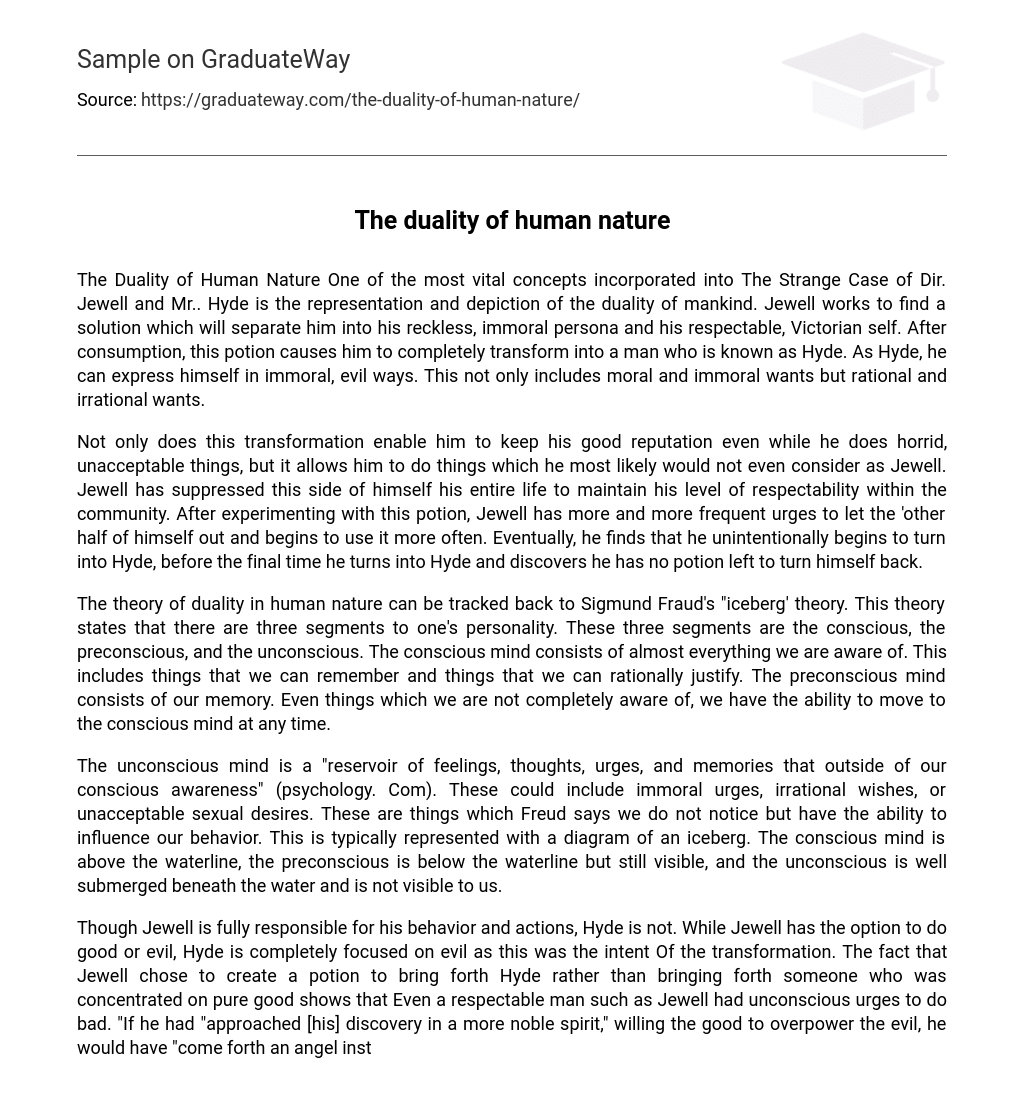The Duality of Human Nature One of the most vital concepts incorporated into The Strange Case of Dir. Jewell and Mr.. Hyde is the representation and depiction of the duality of mankind. Jewell works to find a solution which will separate him into his reckless, immoral persona and his respectable, Victorian self. After consumption, this potion causes him to completely transform into a man who is known as Hyde. As Hyde, he can express himself in immoral, evil ways. This not only includes moral and immoral wants but rational and irrational wants.
Not only does this transformation enable him to keep his good reputation even while he does horrid, unacceptable things, but it allows him to do things which he most likely would not even consider as Jewell. Jewell has suppressed this side of himself his entire life to maintain his level of respectability within the community. After experimenting with this potion, Jewell has more and more frequent urges to let the ‘other half of himself out and begins to use it more often. Eventually, he finds that he unintentionally begins to turn into Hyde, before the final time he turns into Hyde and discovers he has no potion left to turn himself back.
The theory of duality in human nature can be tracked back to Sigmund Fraud’s “iceberg’ theory. This theory states that there are three segments to one’s personality. These three segments are the conscious, the preconscious, and the unconscious. The conscious mind consists of almost everything we are aware of. This includes things that we can remember and things that we can rationally justify. The preconscious mind consists of our memory. Even things which we are not completely aware of, we have the ability to move to the conscious mind at any time.
The unconscious mind is a “reservoir of feelings, thoughts, urges, and memories that outside of our conscious awareness” (psychology. Com). These could include immoral urges, irrational wishes, or unacceptable sexual desires. These are things which Freud says we do not notice but have the ability to influence our behavior. This is typically represented with a diagram of an iceberg. The conscious mind is above the waterline, the preconscious is below the waterline but still visible, and the unconscious is well submerged beneath the water and is not visible to us.
Though Jewell is fully responsible for his behavior and actions, Hyde is not. While Jewell has the option to do good or evil, Hyde is completely focused on evil as this was the intent Of the transformation. The fact that Jewell chose to create a potion to bring forth Hyde rather than bringing forth someone who was concentrated on pure good shows that Even a respectable man such as Jewell had unconscious urges to do bad. “If he had “approached [his] discovery in a more noble spirit,” willing the good to overpower the evil, he would have “come forth an angel instead of a fiend”.
Hyde on the other hand has no choice other than to do evil, and therefore it is arguable whether he should really be blamed for his actions. Though duality in human nature is the central idea of the book, we do not come fully aware or even able to understand how it has any relevance to the book until the very end. Jewell very clearly states his thoughts on this in chapter 10 “man is not truly one, but truly two”. Not only does he believe this, but also he believes that these two sides of man are “Polar twins”.
Though the large majority of the focus is placed on Jewell when trying to express this concept, we also see Deuteron becoming “curious” at times which suggests that these typically unacceptable behaviors and feelings were widespread throughout the community. Despite his clearly stated belief of the existence f duality in human nature, we are left to determine what the two sides of man are. It is suggested that they could be the good and evil, one’s primitive nature and the restrictions placed on them by society, rational and irrational thoughts.
Another way to look at this concept is that rather than the focus being placed on the transformation between Jewell and Hyde, to focus on him as a person. It has been suggested by theorists that Jewell is representative of a primitive being in a society which has managed to domesticate him. Hyde is described to be quite primitive; hairy, short and even “troglodytes”. Not only does this enable us as the reader to ponder the duality of human nature, but also It brings forth the entire concept of human nature.
One could question the effect society has on an individual, and whether all humans would share similar characteristics if we were not shaped by different societies. Again, Hade’s “troglodytes” character suggests that this could have been intentional. To conclude, I believe that Stevenson has effectively depicted the essential components of the concept of duality in nature while still leaving the reader with enough room to take different viewpoints on what it was trying to emphasize.





